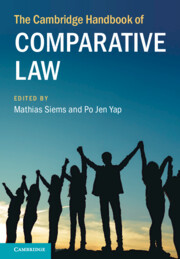Book contents
- The Cambridge Handbook of Comparative Law
- The Cambridge Handbook of Comparative Law
- Copyright page
- Contents
- Figures
- Tables
- Contributors
- Preface
- Abbreviations
- 1 Introduction
- Part I Methods of Comparative Law
- Part II Legal Families and Geographical Comparisons
- Part III Central Themes in Comparative Law
- Part IV Comparative Law beyond the State
- 28 Comparative International Law
- 29 Transnational Regulation
- 30 Quantitative Forms of Legal Governance
- 31 Comparative International Arbitration Law
- 32 Cross-Border Judicial Dialogue
- 33 Comparing Regional Law
- 34 Comparative Conflict of Laws
- 35 Comparative Indigenous Law
- 36 Comparative Legal Education
- Index
32 - Cross-Border Judicial Dialogue
from Part IV - Comparative Law beyond the State
Published online by Cambridge University Press: 26 January 2024
- The Cambridge Handbook of Comparative Law
- The Cambridge Handbook of Comparative Law
- Copyright page
- Contents
- Figures
- Tables
- Contributors
- Preface
- Abbreviations
- 1 Introduction
- Part I Methods of Comparative Law
- Part II Legal Families and Geographical Comparisons
- Part III Central Themes in Comparative Law
- Part IV Comparative Law beyond the State
- 28 Comparative International Law
- 29 Transnational Regulation
- 30 Quantitative Forms of Legal Governance
- 31 Comparative International Arbitration Law
- 32 Cross-Border Judicial Dialogue
- 33 Comparing Regional Law
- 34 Comparative Conflict of Laws
- 35 Comparative Indigenous Law
- 36 Comparative Legal Education
- Index
Summary
Our understanding of cross-border judicial dialogue is dominated by the Global North, especially the analysis of the European judicial space, which has limited application outside Europe, and ‘global judicial dialogue’, which is a rather asymmetric phenomenon: Global South courts such as the South African and Colombian constitutional courts cite totemic Western courts such as the US and German courts with far greater frequency than vice versa. This chapter seeks to enhance our understanding of judicial dialogue from the African and Latin American perspectives, nuancing what dialogue means in Global South contexts by comparing the different patterns and facilitating conditions in these regions, including the impact of shared languages and legal traditions, the development of regional integration projects, and pan-regional democratic development. It is argued that leading national courts play highly significant roles in fostering intra-regional dialogue but can also hamper such dialogue by prioritising global extra-regional interlocutors in their citation practices and reproducing global dynamics through asymmetric citation patterns at the intra-regional level. While this pattern highlights the difficulty of de-centring and challenging Global North epistemic dominance in the arena of judicial dialogue, it also suggests that considered changes in judicial, practitioner, and scholarly practice and collaboration can disrupt these dynamics and generate more inclusive dialogue.
Keywords
- Type
- Chapter
- Information
- The Cambridge Handbook of Comparative Law , pp. 625 - 648Publisher: Cambridge University PressPrint publication year: 2024



